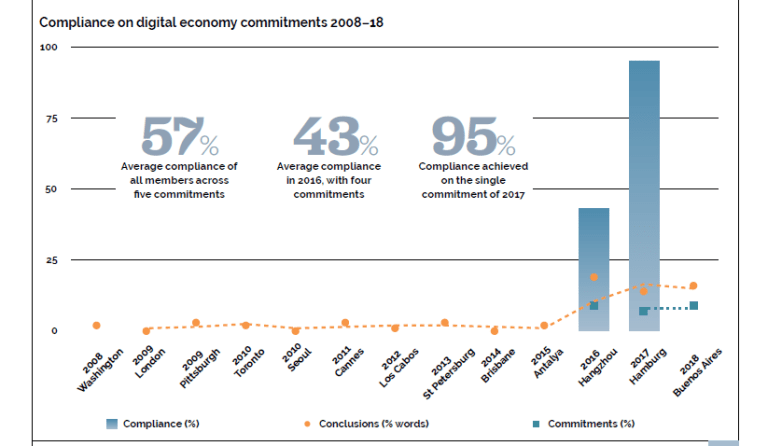Challenge
Proposal
When G20 leaders meet in Osaka, they will discuss the digital economy as one of their priorities. Japan as summit host will focus on securing a free, inclusive and sustainable future society, through development centred on digital innovation. G20 leaders will discuss artificial intelligence, robotics and cryptocurrency regulation.
The Organisation for Economic Co-operation and Development’s 2019 Roadmap for the Future highlights five actions required to deal with the transformation of the digital economy. The OECD also recommends that the G20 advance talks on monitoring innovation, cryptocurrency regulation, data flows and digital skills. As G20 members struggle to keep up with the rapid pace of digital innovation, many countries experience the growth of digitalisation at different paces.
Conclusions
The term ‘digital economy’ was first used by G20 leaders at their 2013 St Petersburg Summit, as the growth of online transactions had left gaps in the existing international taxation framework. The G20 had first acknowledged that digitalisation was an opportunity at the 2008 Washington Summit, dedicating 88 words to it in its communiqué. Leaders noted the digital economy as a growing concern in 289 words at the 2009 Pittsburgh Summit. They followed with 229 words at the 2010 Toronto Summit, 372 at the 2011 Cannes Summit, and 169 at the 2012 Los Cabos Summit. After a jump to 760 words at the 2013 St Petersburg Summit, attention dropped to 299 words at the 2015 Antalya Summit. At the 2016 Hangzhou Summit attention spiked to 3,042 words and at the 2017 Hamburg Summit to a peak of 5,029 words. At the 2018 Buenos Aires Summit it dropped to 1,420 words.
Commitments
From 2008 to 2018, the G20 made 28 core collective, politically binding, future-oriented commitments on the digital economy and another 37 related ones, for a total of 65 overall. The 2016 Hangzhou Summit made the first commitments on the digital economy, producing 20. Hamburg rose to 35 commitments, the largest number ever, with 28 of these on gender and the digital economy. The number of commitments on the digital economy made at the Buenos Aires Summit dropped to 10. Beyond but still within the digital world were commitments on information and communications technologies, labour and employment, the new industrial revolution, digital trade and digital inclusion.
Compliance
Of the 28 core digital commitments, the G20 Research Group assessed five and found that G20 members complied with their commitments at an average of 57%. The four commitments made at the 2016 Hangzhou Summit averaged 43%. The one assessed commitment from Hamburg – on fostering favourable conditions for the development of the digital economy and ensuring competition to foster innovation – had 95% compliance.
Also assessed were two development-focused digital commitments and two on technological innovation or ICT. These four averaged compliance of 85%.

Corrections
The G20 does comply positively with its commitments on the digital economy, especially the commitments on digitally related development and innovation. But there is much room for improvement. Three ways to do so stand out.
First, G20 leaders should make more commitments on digitalisation. The two summits with the highest number of such commitments – Hangzhou with 20 and Hamburg with 35 – had average compliance with them of 65% and 93% respectively.
Second, the G20 should hold regular pre-summit meetings of the ministers responsible for the digital economy and digitalisation. The 2017 Hamburg Summit, the only one to hold such a meeting, had 95% compliance with its digital commitments. This correlation also arises in the similar areas of finance and of labour and employment.
Third, in the text of its commitments on the digital economy, the G20 should include a reference to the core international organisation, in this case the OECD. It can do so at Osaka by explicitly supporting the OECD’s Roadmap for the Future.
The views and opinions expressed in this article are those of the authors and do not necessarily reflect the views of the Global Solutions Initiative. This article was originally published in G20 Japan: The 2019 Osaka Summit by GT Media Group and the G20 Research Group, 2019. View the original article.








